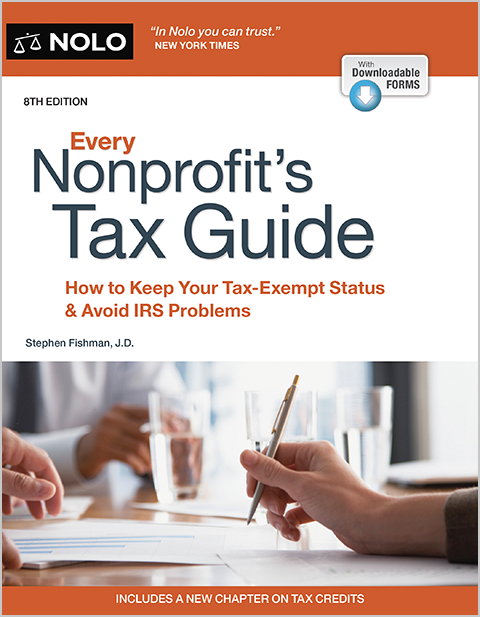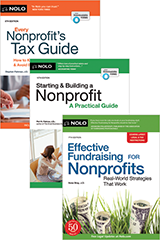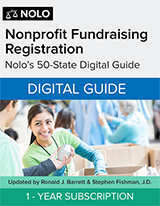A step-by-step resource
Every Nonprofit's Tax Guide
How to Keep Your Tax-Exempt Status & Avoid IRS Problems
- Product Details
- a detailed explanation of Form 990
- requirements for filing Form 990-EZ electronically
- how to file Form 1099-NEC
- conflicts of interest and compensation rules
- charitable giving rules
- unrelated taxable business income rules
- lobbying and political activity restrictions, and
- nonprofit bookkeeping.
- Sample Conflict of Interest Policy
- Rebuttable Presumption Checklist
- Family and Business Relationship Questionnaire
- Expense Report
- About the Author
- Table of Contents
- What Do We Mean When We Say “Nonprofit”?
- The Life Cycle of a Nonprofit
- IRS Audits
- The Nuts and Bolts of the Filing Process
- The 990-N Postcard Filing—As Simple as It Gets
- Form 990-EZ: The E-Z Way Out
- Form 990: Just Hold Your Nose and File It
- Letting the Public See Your Report Card: Disclosure of Form 990
- Notifying the IRS If You Terminate, Merge, or Contract Your Nonprofit
- What to Do If the IRS Has Revoked Your Nonprofit’s Tax-Exempt Status
- Why Keep Financial Records?
- What Does the IRS Require?
- Do You Need an Independent Audit?
- Minding the GAAP
- Volunteers—The Backbone Workforce of Nonprofits
- Reimbursing Your Volunteers—Know the Rules
- Unreimbursed Volunteer Expenses
- Benefits and Freebies—How to Show Your Appreciation Tax Free
- Paid Help: Employees and Independent Contractors
- Hiring Independent Contractors
- Hiring Employees
- Affordable Care Act (ACA) and Nonprofit Employers
- Your Role as a Nonprofit
- Threshold Requirements for Deducting Donations
- Annual Ceilings on Charitable Deductions
- What Can a Donor Contribute?
- When Is a Contribution Made for Tax Purposes?
- Special Gifts—Earmarked, Restricted, and Conditional
- If Your Nonprofit Provides Goods or Services
- Cash Contributions
- Cash Gifts From IRAs
- Interest-Free Loans
- Quid Pro Quo Contributions
- Charity Auctions
- Annual Deduction Limit for Property Donations
- Valuing Property Donations—An Art, Not a Science
- Different Types of Property Donations
- Documenting Property Donations
- A Nonprofit Is Not a Personal Piggy Bank
- The IRS Intermediate Sanctions Minefield
- Transactions With Disqualified Persons—How to Avoid Problems With the IRS
- Excessive Compensation for Services: The Most Common Excess Benefit
- Correcting and Reporting Excess Benefit Transactions
- The IRS’s Sentence of Death: Revocation of Tax-Exempt Status
- What Is UBIT?
- Activities Exempt From UBIT
- Do You Owe UBIT?
- Calculating UBIT With Multiple Business Activities
- Filing UBIT Tax Returns
- Lobbying by Nonprofits—What’s Allowed and What’s Not
- Political Campaign Activities—An Absolute Ban
- Getting Around the Restrictions
- Tax Credits for Nonprofits with Employees
- Energy-Related Tax Credits
- Help From the IRS
- Other Helpful Publications and Websites
- How to Use the Downloadable Forms on the Nolo Website
- Editing RTFs
- List of Forms
- Sample Chapter
- how to file annual information returns with the IRS
- what types of records your nonprofit is required to keep
- classifying workers as employees or independent contractors and dealing with employment taxes
- how to comply with the tax laws governing the use of volunteers
- the deductibility of charitable contributions
- when you must provide written substantiation for contributions
- avoiding IRS taxes or penalties due to conflicts of interest, payment of excessive compensation, insider transactions, and other prohibited behavior
- how to avoid having to pay taxes on side businesses your nonprofit conducts to earn extra income
- what types of lobbying are and aren’t allowed, and
- how to steer clear of the prohibition on political activity.
- Forms
Nonprofits enjoy privileges not available to other organizations. But these privileges come with obligations: Nonprofits must comply with special IRS rules and regulations to maintain their tax-exempt status.
Practical, comprehensive, and easy to understand, Every Nonprofit’s Tax Guide explains ongoing and annual IRS compliance requirements for nonprofits, including:
Whether you are just starting your nonprofit or are well established, you’ll find all the information you need to avoid the most common issues nonprofits run into with the IRS.
“In Nolo you can trust.”—New York Times
“Nolo is a pioneer in both consumer and business self-help books and software.”—Los Angeles Times
Introduction
1. Nonprofits and the IRS
2. Annual IRS Filings—The Form 990
3. Record Keeping and Accounting
4. Volunteers, Employees, and Independent Contractors
5. Charitable Giving—The Basics and Cash Donations
6. Property Donations
7. Excessive Compensation, Sweetheart Deals, and Other Ways to Get in Trouble With the IRS
8. Nonprofits That Make Money and UBIT
9. Lobbying and Political Campaign Activities
10. Tax Credits for Nonprofits
11. Help Beyond This Book
Appendix
Index
Introduction
This book is for you if you have a nonprofit that is up and running, whether it’s been one day or one decade. You have dealt with the IRS already because you have your tax-exempt status. Now you’re wondering what else the IRS has in store for you and your nonprofit? The answer is: A lot.
Your nonprofit’s relationship with the IRS doesn’t end when you receive your tax-exempt status. Indeed, that’s only the beginning. The IRS will continue to oversee your compliance with the myriad of complex tax laws and regulations governing nonprofits. Dealing with the IRS and its rules is the price all nonprofits pay in return for the substantial tax benefits they receive.
Failure to comply with nonprofit tax laws can lead to dire con-sequences—revocation of your tax-exempt status, or the imposition of taxes and penalties on your nonprofit, or even on your officers, directors, or employees personally. The Tax Cuts and Jobs Act (TCJA), the most far-reaching tax reform law in more than 30 years, took effect in 2018. It dramatically altered the tax environment for charitable giving and imposed new restrictions and rules for nonprofits.
Fortunately, most nonprofits can handle IRS compliance tasks themselves or with minimal help. This book can help. It contains step-by-step guidance on:
Running a nonprofit is difficult enough these days without having to worry about the IRS looking over your shoulder. Turn to this book whenever you have a question about IRS rules or nonprofit compliance issues.
TIP
What this book is not. This book is not about how to form a nonprofit corporation or apply for IRS recognition of your nonprofit’s tax-exempt status. (For guidance on these tasks, refer to How to Form a Nonprofit Corporation, by Anthony Mancuso (Nolo).) It has been written primarily for Section 501(c)(3) organizations that qualify as public charities and it doesn’t cover the special tax rules applicable to private foundations. Moreover, while much of the material here is applicable to nonprofits other than Section 501(c)(3) organizations, this book has not been written with such organizations in mind.
We hope you enjoyed this sample chapter. The complete book is available for sale here at Nolo.com.
This Book Comes With a Website
Nolo’s award-winning website has a page dedicated just to this book, where you can:
Download Forms: The forms in this book are accessible online. After purchase, you can find a link to the URL in the Appendix.
And that’s not all. Nolo.com contains thousands of articles on everyday legal and business issues, plus a plain-English law dictionary, all written by Nolo experts and available for free. You’ll also find more useful books, software, online services, and downloadable forms.
-
Don’t miss this book!
-
I’m new to making decisions for a Nonprofit. This guide helped in so many ways and it will in the future. It answered questions i did not know to ask in addition to the ones I did have. It is significant in needed details regarding making money and donations. If you miss the section on contractors, the IRS is willing to teach you, but not for 40 bucks. It has clear instructions and reasoning.
Posted on 9/12/2023
-
Review
-
I found just the information I needed and it was clearly explained.
Posted on 9/12/2023
-
Review
-
Amazing Book to purchase
Posted on 9/12/2023
Customers Who Bought This Item Also Bought
Nonprofit Corporations: Tax Exemption
How to Keep Your Tax-Exempt Status & Avoid IRS Problems
What It Takes to Qualify for 501(c)(3) Tax-Exempt Status

 Available as part of
Available as part of 

